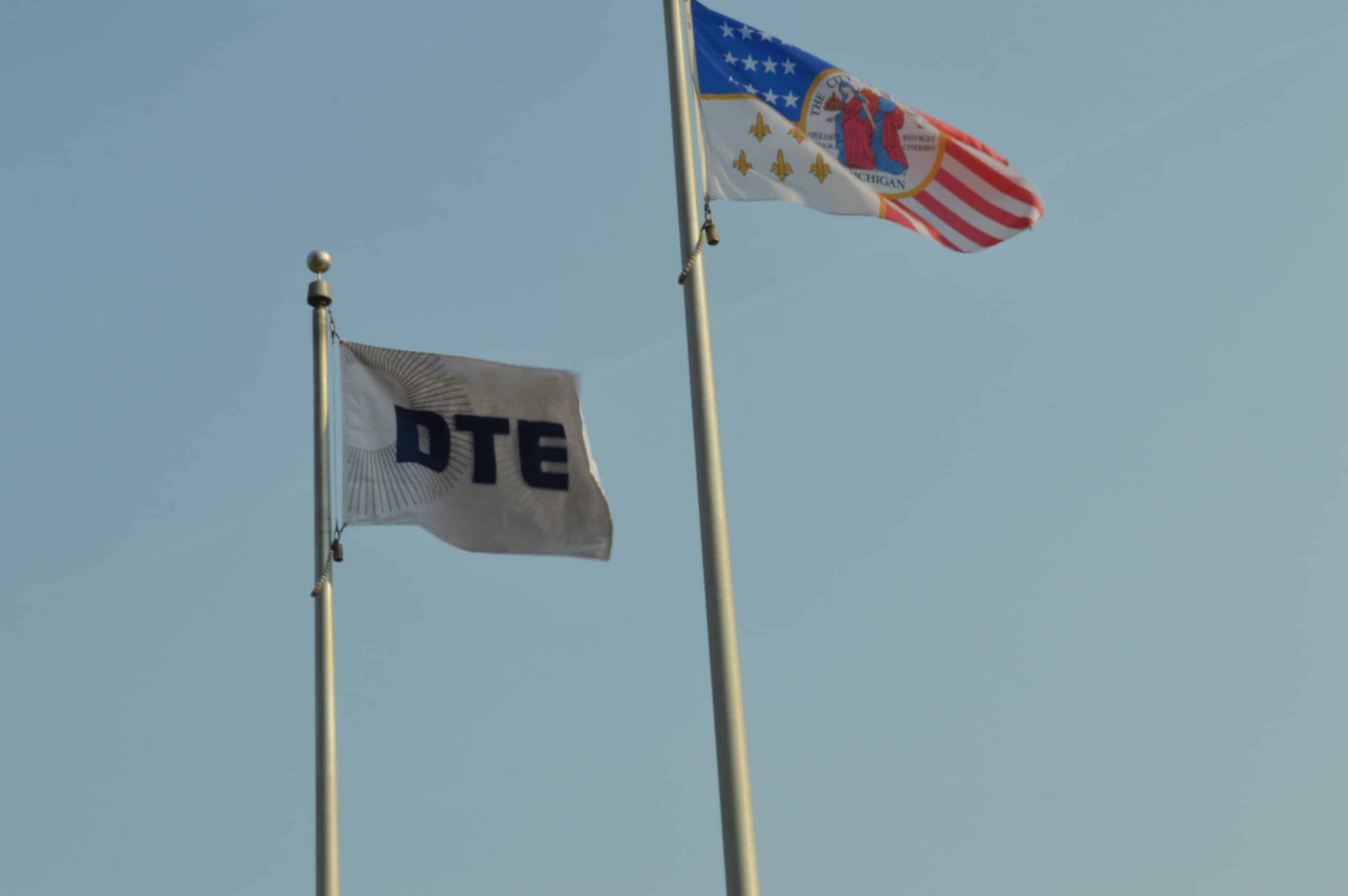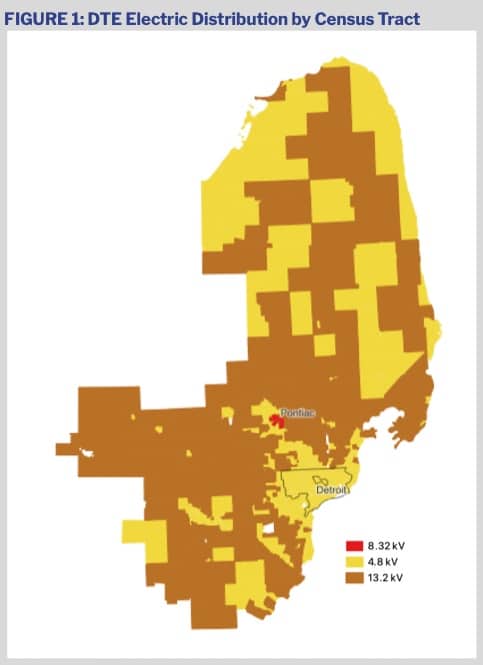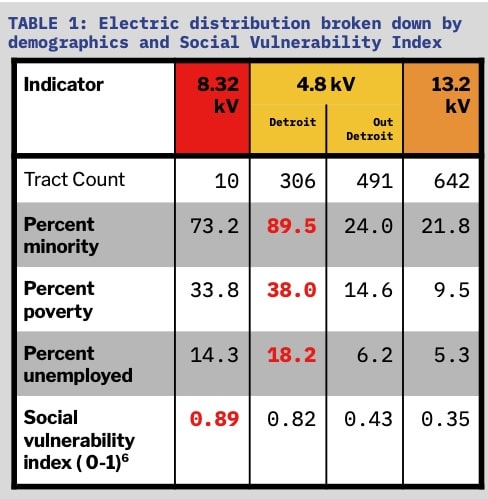Amid controversies, DTE Energy continues to spend big in Michigan and nearly every lawmaker accepts

Key Points:
- Nearly every member of the Michigan legislature has accepted DTE Energy money.
- Environmental justice coalitions, consumer groups, and clean energy advocates are growing frustrated with DTE Energy’s utility service, political advocacy, and high rates.
- Lawmakers and regulators are under scrutiny for their unwillingness to advance certain policies aimed at helping consumers.
Michigan lawmakers facing mounting pressure to rein in DTE Energy lambasted the utility for days-long power outages in August and urged regulators to strike down its 8.8% electric rate increase request. But campaign finance records reveal DTE’s tight grip on state officials, who have taken $1.26 million combined from utility-affiliated donors over the course of their political careers.
Of Michigan’s 148 state senators and representatives, 138 – almost all of them – have logged campaign contributions from DTE’s Political Action Committee (PAC), its executives and lobbyists, or both. Gov. Gretchen Whitmer leads all state elected officials with $235,900 in donations tied to DTE, dating back to her time in the state legislature in the early 2000s. The company has bet big on Whitmer in her time as governor, even raising money for her. Most recently, Whitmer accepted $39,450 from DTE executives in a mid-July giving blitz.
Whitmer is up for re-election this November when all state House and Senate seats will also be on the ballot. DTE, along with the other monopoly utilities in the state, is overseen by regulators appointed to the Michigan Public Service Commission (MPSC) by the governor. If Whitmer wins again, she will have the opportunity to reappoint two of the three regulators she appointed during her first term, or select new members altogether.
The state legislature also has an enormous impact on DTE’s business, setting the statutory framework in which the utility and its regulators operate. In addition, state lawmakers can use their positions to investigate issues like chronic power outages, an increasingly popular idea among advocacy organizations.
But in Michigan, the path to legislative action runs through a wall of DTE cash.
“We can’t basically regulate the utilities because they’re the ones regulating us as lawmakers,” State Rep. Yousef Rabhi, a Democrat, said earlier this year. Rabhi has called for a prohibition on regulated utilities contributing to state officials, and has pushed a suite of bills that require utilities to provide hourly bill credits during outages, improve transparency about outages, and expand opportunities for the public to weigh in on utility planning.
Rep. Abraham Aiyash, a Democrat, is pursuing the legislative package alongside Rabhi. The two representatives, along with eight of their colleagues, have not accepted DTE-linked campaign money. Aiyash has publicly criticized DTE and its political machine.
“DTE makes millions on Wall Street but doesn’t invest it back in the grid. Michigan’s private utility companies care more about profit and political power than they do about keeping the actual power on,” Ayash tweeted in late August, when hundreds of thousands of DTE customers lost power after a storm. For many of them, the lights stayed out for days.
Earlier this year, when he and Rabhi proposed legislation requiring utilities like DTE to compensate customers for those kinds of outages, Ayash said he hoped his legislative colleagues would “look more at their residents and less at the coffers of DTE and Consumers [Energy].”
Legislative leaders are biggest beneficiaries of DTE donations
In the legislature, DTE has funneled the most money to House and Senate leaders who have wide latitude to set a legislative agenda and scuttle bills.
The data that informed this analysis are available here.
Sen. Aric Nesbitt, the Republican who presides over the Senate as President Pro Tempore, has raked in more than $69,500 from DTE-affiliated donors during his career. As his chamber’s leader, Nesbitt decides which legislators serve on which committees – a key consideration for utilities whose business is molded by state law in many ways.
Sen. Ken Horn, a Republican who previously chaired the House Energy and Technology Committee and is currently vice chair of the Senate Energy and Technology Committee, has taken $53,250 from DTE-affiliated donors during his time in office. The Senate energy committee’s current chair, Republican Dan Lauwers, has received $25,400 from DTE-affiliated donors.
These committees cover energy and utility issues, and their leaders have discretion over which bills can get hearings and ultimately advance to a vote. If committee chairs do not allow a hearing on a bill, there is no opportunity for legislators to take action on it. That is a familiar frustration for clean energy and consumer advocates who have frequently been at odds with energy committee leaders. DTE continues to fight bills that would remove Michigan’s arbitrary cap on distributed solar. In addition, the utility has consistently opposed proposals for a more ambitious renewable energy standard in Michigan, even though such measures are major drivers of renewable energy expansion.
Speaker of the House Jason Wentworth, a Republican, is among DTE’s top beneficiaries in his chamber, with $46,950 in DTE-tied donations. Like Nesbitt, he sets committee rosters and chose Rep. Joe Bellino, a DTE darling, to return as chair of the influential House Energy Policy Committee. Bellino has logged $36,820 in DTE-linked contributions over his career, and the utility has even paid for him to play golf with professionals at a PGA tournament. In past sessions, Bellino has aligned with DTE in refusing to allow his committee to vote on legislation that would have lifted the cap on distributed generation.
Other notable legislators who have raked in significant campaign money from DTE donors include Senate Minority leader Jim Ananich, a Democrat, who is behind only Nesbitt with $67,950 in related contributions. House Democratic Leader Donna Lasinski has raked in $50,300 from DTE-linked donors during her time in office.
Nearly every member of Senate leadership from both parties has taken DTE-connected campaign contributions, for a total of $291,940. All except one, Democratic Sen. Rosemary Bayer, received thousands of dollars – and in many cases, tens of thousands of dollars. Bayer returned the single $250 donation she received from DTE’s PAC in 2019 and hasn’t logged any other DTE contributions.
House leadership members have also accepted money from utility-linked donors, adding up to $111,800. Rabhi, who has forcefully criticized DTE in his time as Democratic Floor Leader, stands apart from his colleagues. He returned $400 in total donations DTE’s PAC made to his campaign in 2017 and 2019, and hasn’t received any other DTE-related contributions.
“I’ve been in office for six years now. I have introduced dozens of bills to try to expand solar energy in Michigan, stop climate change, expand our renewable energy portfolio, and every single one of those bills has been blocked – not by magic, not by some external alien force coming in, it’s DTE,” Rabhi testified at a recent public hearing on DTE’s proposed rate hike. “It’s DTE, it’s Consumers [Energy], it’s their lobbyists on the tiles in the hallway calling legislators up, telling them they have to take their names off my bills.”
DTE under fire for major rate hike, persistent outages
Two summers in a row, DTE customers have suffered lengthy outages that risked their health and safety. Data show Michiganders pay the highest rates in the Midwest region, but their utility service is among the most unreliable.
After widespread outages plagued DTE customers in the summer of 2021, lawmakers bowed to public pressure to investigate the problem. In the weeks before a House committee held hearings on the matter, 11 of 16 committee members received campaign contributions from utility-affiliated PACs, according to a Detroit News analysis. DTE’s PAC gave six of those legislators $1,000 apiece five days before one of its executives appeared before the body.
“DTE couldn’t do this to our communities if the regulators or the elected officials didn’t let them,” OT Goree, a DTE customer and member of the social justice group Emergent Justice, said in April.
Public anger with DTE escalated to new heights in August when the MPSC, the state’s utility regulator, held a first-of-its-kind public hearing on DTE’s request to raise rates by 8.8%. Community members jammed the hearing room, and commissioners had to cut off spoken testimony after it ran well over the allotted two hours. All but a handful of speakers voiced opposition to the rate hike. Several dozen DTE customers have also filed written comments, almost all deriding the proposed rate increase.
Several elected officials testified at the public hearing, including U.S. Rep. Rashida Tlaib, who represents the Detroit area that houses DTE customers most besieged by outages and low-income communities already struggling with their utility bills.
“What does DTE do when it’s not shutting people off or failing to fix outages? They’re jacking up your rates. Since 2015, DTE rate increases generated $774 million, the second highest rate of increase of any investor-owned utility in the country,” the congresswoman wrote in a Twitter thread that dovetailed with her spoken remarks. “DTE Energy is one of the most expensive and unreliable utility companies in the nation. They need accountability, NOT another rate hike that puts the lives of millions in danger,” the thread continued.
Tlaib also noted that DTE’s prolific political giving has reached almost all Michigan House and Senate members, calling it “disgusting.”
Michigan regulators will decide on DTE’s rate case in November. The proceeding has brought unfamiliar visibility to the MPSC, whose ordinarily low-profile work rarely draws a spirited audience. But as frustration grows with chronic outages, lagging infrastructure updates, and rising bills in DTE territory, the regulatory body is under pressure to prioritize the captive customers bound to DTE. While MPSC members have been supportive of expanded public engagement in DTE’s rate case, some Michigan advocates are skeptical about how far the MPSC is willing to go to hold utilities accountable more broadly.
Aside from the rate case, groups like the Michigan Citizens Utility Board (CUB) negotiated for nearly two years over a $2-per-hour outage credit and bigger payouts for customers who face longer, more destructive service interruptions. CUB also called for stricter rules that disallow utilities like DTE from later recovering those expenses from their customers – an approach similar to that in legislation proposed by Rabhi and Aiyash. But in issuing its order earlier this year, the MPSC tilted toward the status quo. Regulators increased a flat-rate credit to $35 per day for customers who experience prolonged outages under certain conditions, while leaving other issues murkier.
“The MPSC seems to dismiss without, even respectful consideration, arguments put forth by intervening groups like CUB that are trying to represent the public, especially when those arguments collide with the financial interests of utilities,” CUB wrote in its rundown of the decision.
DTE regularly tells its shareholders that it is “operating in a highly constructive regulatory environment.”
DTE political contributions undermine racial equity, climate justice
DTE’s critics say that the company’s political influence contrasts with DTE’s public-facing commitments to advance racial equity. In testimony filed with the MPSC in the rate case, intervenor Jackson Koeppel – former executive director of the nonprofit Soulardarity – noted DTE’s support for politicians pushing bills that would erode voting rights of Michiganders in predominantly Black communities and other communities of color.
Attacks on the democratic process in Michigan sparked a campaign led by the Defend Black Voters Coalition. The coalition has called for corporations, including DTE, to halt campaign contributions to the dozens of Republican state lawmakers who support voter suppression legislation.
“While these companies are happy to spew empty words that make them sound like they’re for the people, it’s far more important to them to put politicians in office that will put corporations over people and keep the rich rich,” Ken Whittaker, executive director of the Michigan People’s Campaign, said earlier this year. “And they don’t care what it takes — even if it means sacrificing the freedom to vote for our community. As working families, we’re fighting back.”
A report on “utility redlining” published in August by We The People, Soulardarity, and the Michigan Environmental Justice Coalition showed that DTE has long delayed basic infrastructure improvements in low-income communities and communities of color, where system cable is commonly more than two decades past its useful life. The consequences of the utility’s inaction continue to play out in real time as those communities grapple with persistent outages and increased vulnerability to extreme weather events fueled by climate change.
“DTE’s political funding dovetails neatly with DTE’s disinvestment in BIPOC communities, making it harder for those most affected by DTE to respond,” Koeppel wrote in DTE rate case testimony. (BIPOC refers to Black, Indigenous, and people of color.)


DTE also using dark money to influence Michigan politics
Beyond making direct contributions to lawmakers’ campaign funds, DTE uses dark-money groups and its foundation to reward politicians and community leaders for supporting its agenda. For example, Michigan Energy First – a front group run by several DTE executives – has invested heavily in state politics. In 2019 alone, the Detroit News found that the group gave $650,000 to a fund tied to the Michigan Republican Party, $250,000 to a fund connected to the Michigan Democratic Party, and $100,000 to a fund that had supported Whitmer. It gave another $20,000 to an organization affiliated with the wife of Wentworth, the House Speaker, according to the Detroit News report.
Another DTE-connected front group, Protect Our Values, emerged this year. Under that name, DTE ramped up its support for Bellino by creating a website to praise him ahead of the Republican primary. Bellino edged out his challenger in the August election to secure his place on the ballot, and potentially his continued committee leadership, in November. DTE has also used its dark-money groups to spread misleading information on pro-solar legislation.
“DTE pursues ‘safe, reliable, clean, and cost-effective electric service’ only to the extent that regulation and popular or political pressure would otherwise limit its pursuit of maximum profits,” Koeppel wrote in recent DTE rate case testimony. “And DTE seeks to limit the degree to which regulation and popular or political pressure can force it to prioritize the public interest over its own profits.”
Methodology
For this analysis, the Energy and Policy Institute reviewed campaign finance records filed from January 2006 through August 2022. This time scope is designed to cover the legislative careers of current state lawmakers, who are bound by term limits that allow them to serve a maximum of two four-year terms (for a total of eight years) in the Senate and three two-year terms (for a total of six years) in the House. This analysis included an additional five years of review for Whitmer, who served in the state legislature before she was elected governor. Contributions returned by candidates were removed from totals.
DTE PAC contributions made from January 2006 through August 2022 are available here.
Campaign contributions made by DTE employees are listed in spreadsheets provided by the Michigan Secretary of State’s Office. The Energy and Policy Institute pulled from this data all contributions made by donors who identified as employees of entities whose names include “Detroit Edison” and “DTE” between January 2006 and August 2022. Removed from giving totals were contributions from DTE employees whose titles do not suggest they are executives or lobbyists. The analysis examined contributions dating back to 2001 for Whitmer.
Update (March 2, 2023): The Energy and Policy Institute has updated its data showing DTE-linked campaign contributions after Michigan’s November 2022 election, which prompted significant turnover in the Michigan House and Senate. The latest data reflects contributions made by DTE’s PAC as well as its executives and lobbyists to current Michigan legislators and three statewide officeholders: Governor Gretchen Whitmer, Attorney General Dana Nessel, and Secretary of State Jocelyn Benson. It removes lawmakers who served last term but are no longer in office, either because they did not run or lost their reelection bids in November.
This update draws from the same required state campaign finance disclosures that informed the original analysis outlined in the Methodology section. It includes contributions made through the end of 2022, the most current information available.
The data that informed this updated analysis are available here.



